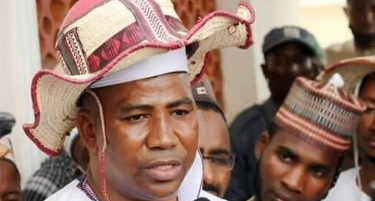Justice Inyang Ekwo of the Federal High Court in Abuja has discharged Bello Bodejo, the leader of Miyetti Allah Kautal Kore, from an alleged terrorism charge brought against him by the office of the Attorney-General of the Federation (AGF).
In his ruling, Justice Ekwo discharged Bodejo after the counsel for the AGF, Aderonke Imana, moved an oral application to withdraw the three-count charge. At the resumed hearing on Wednesday, Imana informed the court of her oral application under Section 108 of the Administration of Criminal Justice Act (ACJA), 2015. She explained that the application was also based on the powers vested in the AGF by Section 174 of the 1999 Constitution (as amended).
Imana elaborated that the Attorney-General of the Federation had instructed her to withdraw the charges against Bodejo in the interest of justice. This move, she asserted, was not just a legal formality but a necessary step to ensure that justice was appropriately served. The counsel for Bodejo did not oppose this application, expressing gratitude towards the AGF for his decision. Ahmed Raji, Bodejo’s lead counsel, subsequently urged the court to discharge his client based on the sections referred to by the prosecution.
The case has drawn significant attention due to the controversial nature of the charges and the high-profile status of Bello Bodejo. The allegations of terrorism had placed Bodejo and the Miyetti Allah Kautal Kore group under intense scrutiny. However, the decision to withdraw the charges underscores the prosecutorial discretion of the AGF and highlights the complexities involved in such high-stakes legal battles.
Justice Ekwo’s decision to discharge Bodejo marks a pivotal moment in this case. The judicial process, though often slow and fraught with tension, has mechanisms in place to ensure that decisions made are in alignment with the principles of justice and fairness. The withdrawal of charges is a significant step, signaling that after careful consideration, the AGF’s office deemed it necessary to halt the proceedings against Bodejo.
The counsel for the AGF, in making the application, relied on statutory provisions that grant the Attorney-General the authority to discontinue any criminal proceedings at any stage before judgment is delivered. This power is critical in maintaining the balance between prosecution and the overarching need for justice. It is an authority that is rarely invoked lightly, indicating the weight of the decision to withdraw the charges against Bodejo.
This development has several implications. For Bello Bodejo, it is a legal vindication, a moment of relief amidst what must have been a tumultuous period. For the legal community and the public, it is a reminder of the intricate balance within the criminal justice system, where prosecutorial discretion plays a crucial role in determining the course of justice.
As the news of Bodejo’s discharge spreads, it will undoubtedly spark discussions about the case’s broader impact, the decision-making processes within the AGF’s office, and the future implications for similar high-profile cases. For now, the court’s ruling stands as a testament to the dynamic and sometimes unpredictable nature of legal proceedings in Nigeria.
Justice Ekwo’s courtroom, on this occasion, became the venue for a significant legal resolution, demonstrating the power of judicial discretion and the importance of ensuring that justice is not only done but is seen to be done. As the legal and public discourse continues, the discharge of Bello Bodejo will be a focal point for discussions on justice, prosecutorial authority, and the legal system’s responsiveness to the demands of justice.




